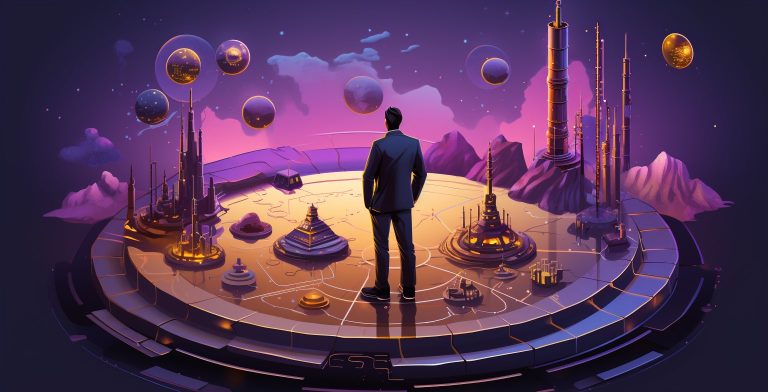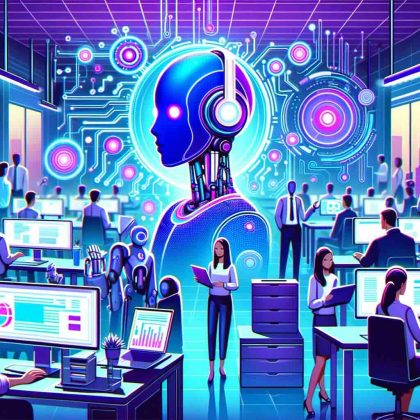The Rise of Citizen Data Scientists: Unleashing the Power of Data in the Modern Era

Introduction to Citizen Data Scientists
In the rapidly evolving world of data science, a new role has emerged that is reshaping the industry: the citizen data scientist. As businesses increasingly rely on data-driven insights, the demand for experts in data science has skyrocketed. However, not every organization can afford or find trained data scientists. Enter the citizen data scientist, a game-changer in the realm of analytics.
Defining the Citizen Data Scientist
The Evolution of Data Roles in Organizations
Historically, data roles in organizations were limited to analysts and IT professionals. But with the explosion of big data and the need for more hands-on-deck, the citizen data scientist has come to the fore. Unlike the expert data scientist, who typically has a deep background in advanced analytics and machine learning, the citizen data scientist possesses a blend of business knowledge and a knack for data analysis. They leverage analytics tools to derive insights, even without a formal background in data science.
Citizen Data Scientist vs. Traditional Data Scientist: Key Differences
While both roles revolve around data science, there are distinct differences. An expert data scientist often delves deep into machine learning models, artificial intelligence (AI), and complex data preparation. In contrast, a citizen data scientist focuses more on practical applications, using AI and analytics to solve business problems. They might not craft intricate machine learning algorithms, but they’re adept at using analytics tools to do the job efficiently.
The Rising Demand for Citizen Data Scientists
The Digital Transformation Wave
The digital age has ushered in a wave of transformations. As organizations strive to stay competitive, they’re turning to data analytics. Gartner predicts that by 2025, citizen data scientists will perform over half of the data science tasks, not expert data scientists. This shift is not just about filling a skills gap; it’s about democratizing data science, making it accessible to more people and departments within an organization.
Bridging the Gap: From Business Intelligence to Advanced Analytics
Traditional business intelligence (BI) focuses on past and present data, but advanced analytics, driven by AI and machine learning, looks to the future. The citizen data scientist plays a pivotal role in this transition. They bridge the gap between basic BI tasks and advanced analytics, bringing a fresh perspective to data analysis. With their unique blend of business acumen and a passion for data, they’re equipped to drive organizations into the future of data science.
The rise of the citizen data scientist signifies a monumental shift in the data science industry. Their emergence is a testament to the ever-evolving nature of data science in the modern era.
Citizen Data Scientists in Today’s Business Landscape
In the dynamic world of data science, the emergence of the citizen data scientist is revolutionizing how businesses approach analytics. As the demand for data-driven insights intensifies, the role of the citizen data scientist becomes increasingly pivotal. But what exactly does this role entail, and why is it so crucial in today’s business landscape?
The Multifaceted Role of a Citizen Data Scientist
Beyond Basic BI: Diving into Advanced Analytics
While traditional analysts focus on business intelligence (BI) to understand past trends, the citizen data scientist delves deeper. They harness advanced analytics to predict future patterns, making data science more proactive than ever. These professionals transform raw data into actionable insights by leveraging analytics tools and artificial intelligence (AI), driving business strategies forward.
The Power User: Machine Learning, Data Mining, and Predictive Modeling
The citizen data scientist is not just an analyst; they’re a power user. With a foundational understanding of machine learning and data analysis, they can craft predictive models that traditional BI tools can’t. Whether it’s using machine learning models to forecast sales or employing data mining techniques to uncover hidden market opportunities, the citizen data scientist stands at the intersection of business acumen and technical prowess.
Why Every Organization Needs a Citizen Data Scientist
Addressing the Shortage of Skilled Data Scientists
Gartner predicts a continued shortage of expert data scientists in the coming years. While trained data scientists are invaluable, not every data task requires their level of expertise. Here’s where the citizen data scientist shines. They bridge the gap, handling tasks that go beyond basic BI but don’t necessarily need the deep expertise of a seasoned data scientist. This balance ensures that organizations can continue their data science endeavors without any hitches.
Cost-Efficiency and Enhanced Analytics Efficiency
Hiring an entire team of expert data scientists can be costly. By integrating citizen data scientists into the mix, businesses can achieve a balance of cost-efficiency and expertise. These professionals, equipped with analytics tools and a solid understanding of data analytics, can execute many tasks at a fraction of the cost, enhancing the overall efficiency of the analytics process.
Gaining Competitive Advantages in the Market
In today’s data-driven market, the organizations that harness their data most effectively often come out on top. With the citizen data scientist’s unique blend of skills, businesses can uncover insights faster and more efficiently. Whether it’s optimizing supply chains using AI or predicting market trends through advanced analytics, these insights provide a competitive edge that’s hard to beat.
The rise of the citizen data scientist is not just a trend; it’s a testament to the evolving nature of data science in the business world. For organizations looking to stay ahead in the data game, understanding and integrating the citizen data scientist into their strategy is the way forward.
Distinguishing Between CDS and Other Data Roles
In the intricate tapestry of data science, various roles contribute to extracting meaningful insights from vast data sets. The citizen data scientist has emerged as a pivotal figure in these roles. But how does a citizen data scientist differ from an expert or analytics translator? Let’s delve into the nuances.
Citizen Data Scientist vs. Expert Data Scientist
Skill Levels and Analytical Complexity
At the heart of data science lies a spectrum of complexity. On one end, we have the citizen data scientist, adept at harnessing analytics tools for data analysis and deriving actionable insights. Their strength lies in translating data into business solutions without delving too deep into the intricacies of machine learning or AI.
On the other end, the specialists dives deep. With a profound understanding of data analytics, artificial intelligence, and machine learning models, they tackle complex problems, often crafting bespoke algorithms tailored to specific challenges.
Tools, Technologies, and Collaboration
While both roles are entrenched in data science, their toolkits differ. A citizen data scientist might rely on user-friendly analytics tools, focusing on data preparation and visualization. In contrast, an expert data scientist delves into advanced analytics, employing sophisticated machine learning and AI tools.
Collaboration is also key. Citizen data scientists often work closely with business teams, bridging the gap between raw data and strategic implementation. Data scientists, meanwhile, might collaborate more with IT teams, ensuring the seamless integration of their complex models into existing systems.
The Emergence of Analytics Translators
Liaising Between Data Science and Business
Enter the analytics translator – a role that has gained prominence as businesses recognize the need to bridge the chasm between data science and business strategy. Unlike the citizen data scientist, who is hands-on with data, the analytics translator acts as a liaison. They don’t craft algorithms or run data analysis but are crucial in ensuring data science efforts align with business objectives.
The Role of Translators in Data-Driven Decision Making
Gartner highlights the importance of analytics translators in modern business. As organizations increasingly rely on big data and advanced analytics, the need for clear communication between data teams and business units becomes paramount. Translators ensure that data-driven insights are not just technically sound but also relevant and actionable for the business. They are pivotal in transforming data science from a technical endeavor to a business-critical process.
As the landscape of data science evolves, understanding its distinct roles becomes crucial. Each role is vital, whether it’s the hands-on approach of the citizen data scientist, the deep technical expertise of the expert data scientist, or the strategic oversight of the analytics translator.
Embarking on the Journey to Become a CDS
The world of data is vast, intricate, and ever-evolving. As businesses increasingly lean on data-driven strategies, a new role has emerged at the forefront: the citizen data scientist. Unlike traditional data roles, this position bridges the gap between technical expertise and business acumen. If you’re considering this path, here’s what you need to know.
Essential Skills and Knowledge for Aspiring Citizen Data Scientists
Harnessing Data Science and Advanced Analytics Techniques
To thrive as a citizen data scientist, one must be well-versed in both basic and advanced analytics techniques. This doesn’t mean you need a Ph.D. in data science, but a solid understanding of the foundational principles is crucial. Familiarize yourself with predictive modeling, machine learning basics, and the intricacies of data preparation. These skills will empower you to extract meaningful insights from vast data sets.
The Importance of Data Visualization and Storytelling
Data, in its raw form, can be overwhelming. The ability to transform this data into visual, digestible, and actionable insights is invaluable. Mastering tools for data visualization, coupled with the art of storytelling, allows citizen data scientists to communicate their findings effectively. It’s not just about numbers; it’s about painting a picture that drives decision-making.
Pathways to Becoming a Citizen Data Scientist
Educational Platforms and Training Opportunities
The journey to becoming a citizen data scientist often begins with education. Fortunately, numerous platforms offer courses tailored to this role. From online courses on platforms like Coursera and Udemy to specialized workshops and boot camps, there’s a wealth of knowledge at your fingertips. You can even use YouTube. Seek out programs that offer a blend of technical training and real-world application.
Practical Steps and Best Practices for Success
Start with a foundation in statistics and gradually delve into more complex areas like machine learning. Engage in hands-on projects, collaborate with peers, and seek mentorship from seasoned data professionals. Stay updated with industry trends, attend webinars, and participate in forums. Remember, continuous learning and practical application are the cornerstones of success in this field.
Conclusion and Future Outlook
The Growing Influence of Citizen Data Scientists in the Data Realm
Predictions for the Next Decade
The next decade promises a surge in the demand for citizen data scientists. As businesses grapple with ever-increasing data volumes, the need for professionals bridging the technical-business divide will skyrocket. The role will evolve, with a greater emphasis on automation, AI integration, and real-time analytics.
H3: Preparing for the Evolving Landscape of Data Science
The world of data science is dynamic. Aspiring citizen data scientists must be adaptable, proactive, and ever-curious to stay relevant. Embrace the changes, upskill regularly, and be at the forefront of data-driven innovation.
In the end, the rise of the citizen data scientist signifies more than just a shift in job roles. It represents a democratization of data, a future where insights are accessible and data-driven decisions are the norm. Are you ready to be part of this revolution?



